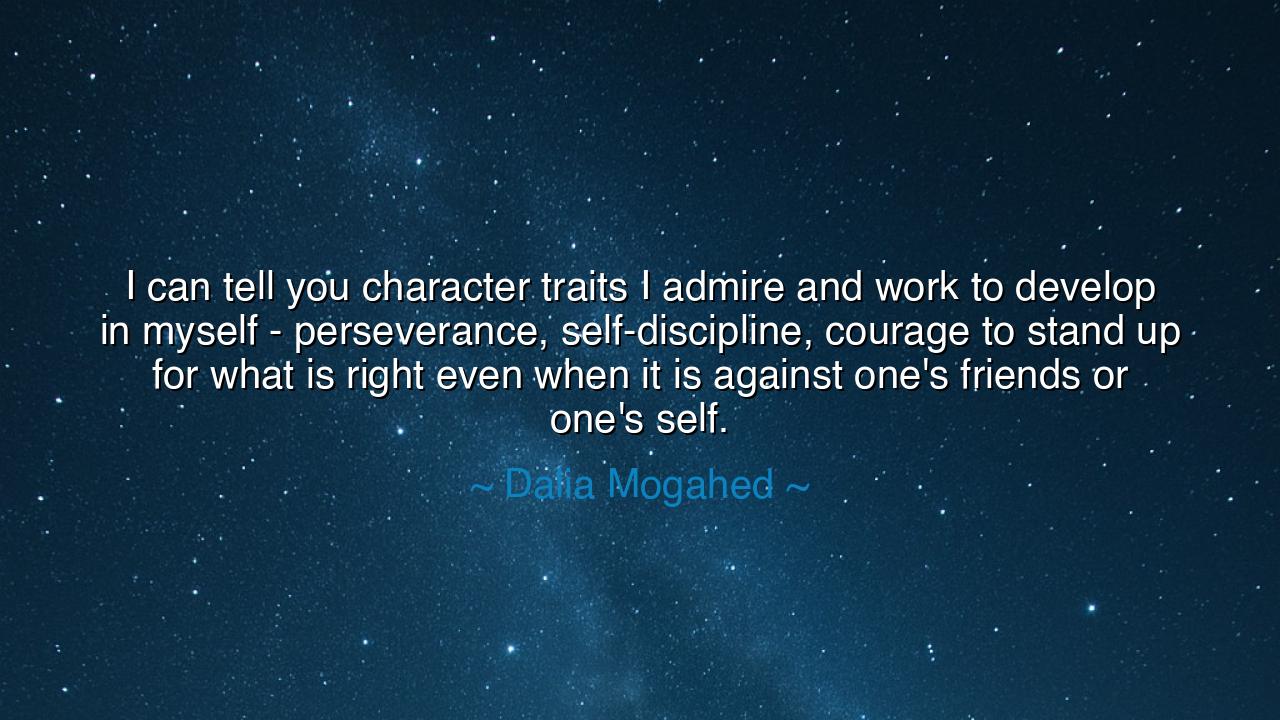
I can tell you character traits I admire and work to develop in
I can tell you character traits I admire and work to develop in myself - perseverance, self-discipline, courage to stand up for what is right even when it is against one's friends or one's self.






“I can tell you character traits I admire and work to develop in myself — perseverance, self-discipline, courage to stand up for what is right even when it is against one’s friends or one’s self.” Thus spoke Dalia Mogahed, a thinker and leader whose voice bridges faith, intellect, and compassion. Her words are a mirror of timeless virtue, a call to those who would live not merely for comfort, but for character. In this reflection, she names the ancient pillars of greatness — perseverance, self-discipline, and courage — not as gifts bestowed upon the few, but as virtues that must be forged by deliberate effort. She reminds us that the true strength of a soul lies not in what it possesses, but in what it strives to become.
To understand Mogahed’s message, one must see her life in the light of its purpose. Born in Egypt and raised in America, she rose to become one of the most respected Muslim voices in the Western world — a scholar, a public servant, and an advocate for understanding across cultures. Her journey was not easy, for to stand between worlds is to face criticism from all sides. Yet through perseverance, she endured; through self-discipline, she mastered her craft; and through courage, she spoke truth where silence would have been safer. Her words, born from experience, echo a lesson as old as civilization itself: that the measure of a person is not in ease, but in endurance — not in comfort, but in conviction.
The first virtue she names, perseverance, is the armor of the steadfast spirit. It is the refusal to yield when storms rage, the determination to continue when all paths seem closed. Many dream of greatness, but few persist long enough to reach it. Perseverance transforms ordinary effort into extraordinary achievement. Think of Thomas Edison, who failed a thousand times before he lit the world. When asked about his failures, he replied, “I have not failed; I have simply found a thousand ways that do not work.” This is the spirit Mogahed admires — the unwavering will to rise again, not because success is certain, but because the cause is worthy.
The second virtue, self-discipline, is the law of the inner kingdom. It is the mastery of impulse, the strength to command the self rather than be ruled by it. Without discipline, even the greatest talents scatter like sand before the wind. It is discipline that keeps the scholar studying when the mind grows weary, the artist practicing when inspiration fades, the believer praying when doubt whispers. The ancients called it temperance, the golden balance between indulgence and neglect. A person without self-discipline may begin many things, but he will finish none. A person who possesses it, however, carries the power to shape his destiny.
But the third virtue, courage, is the crown of them all. It is easy to stand for what is right when all applaud, but the true test of character is to stand when one stands alone — when doing right means losing favor, friends, or comfort. Courage to stand up for what is right even when it is against one’s friends or one’s self is the highest form of integrity, for it demands that we sacrifice not only popularity but pride. Consider the life of Socrates, who refused to abandon truth even under the threat of death. His friends begged him to flee his sentence, yet he chose to drink the hemlock, saying that living wrongly was worse than dying justly. In his courage, he became immortal, for he proved that the soul’s strength is greater than the fear of loss.
Dalia Mogahed’s wisdom shines most brightly in this: she does not claim perfection, but speaks of working to develop these traits. Virtue, she reminds us, is not inherited; it is cultivated daily, like a garden that must be tended through seasons of struggle. One does not wake with perseverance — one earns it through failure. One does not possess self-discipline by nature — one builds it through habit. And one does not discover courage in comfort — one finds it only in the face of fear. The ancients knew this well: character is not born, it is forged, and the fire that tempers it is trial.
So let this teaching be passed on, from generation to generation: seek not the praise of others, but the perfection of your character. Be patient when the road is long; be disciplined when temptation whispers; be brave when truth demands your voice. When the time comes — and it always does — you will find that these virtues are not burdens, but wings. For the one who perseveres never truly fails, the one who disciplines himself is never enslaved, and the one who has courage never walks in darkness. As Mogahed teaches, the path to greatness lies not in the riches of the world, but in the riches of the soul — and the highest wealth of all is the character we forge with our own will.






AAdministratorAdministrator
Welcome, honored guests. Please leave a comment, we will respond soon